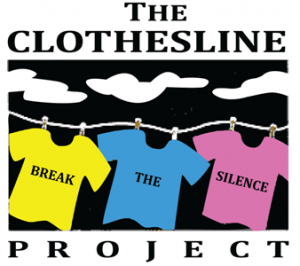The Clothesline Project began in 1990 as a way to raise awareness about an issue that is still affecting people’s lives today; domestic violence.
In 1990, the project began as a way to raise awareness and build support specifically for women who experience domestic abuse, but it has now grown to show support for any one who has experienced domestic violence or been witness to it.
“It began as a way for women affected by violence to express their emotions on a shirt which was then hung on a clothesline to be viewed by others, testimony to address this issue. With the support of many, it has since spread world-wide,” according to the official National Network website of The Clothesline Project. Raising awareness in one way that the conversation about violence can start in families and relationships to bring about change.
The official National Network website of The Clothesline Project says that the project is a “vehicle for (people) affected by violence to express their emotions by decorating a shirt.”
In this way, decorating shirts can be therapeutic for the victims of domestic abuse as well as contributing to the case of raising awareness.
Since October is Domestic Violence Awareness month, KapCC is participating in The Clothesline Project on Tuesday, Oct. 8. Everyone is invited to decorate a paper shirt to be hung on a clothesline display.
The Violence Prevention Task Force says that “(t)he shirts represent the experiences of survivors, friends, and anyone who supports a non-violent community.”
To create a t-shirt of your own and show support for those in the KapCC community who are experiencing domestic violence, the Ho’okele Center (by Subway) will have paper t-shirts and decoration supplies from 10 a.m. to 1 p.m., Oct. 8.
The shirts will be hung on clothes lines around campus along side shirts that KapCC students have made in past years.
KapCC began designing t-shirts and participating in The Clothesline Project in 2009 by sharing messages of non violence and support created by students. While it is sad that the necessity for participating in this project is on going, by raising awareness, people who need help will find out where they can get it, people who are witnesses may find strength to speak out, and people who are perpetrating violence on others may be inspired to take a higher road by seeing the pain they cause in another light.
Any questions about the event or domestic violence can be sent to KapCC’s Violence Prevention Task Force at vptf@hawaii.edu.
For anyone seeking help, the Sex Abuse Treatment Center has a 24 hour hotline that is available and anonymous to any one at (808) 524-7273.
KapCC offers mental health counseling that can be accessed by calling (808) 734-9522.
UH has a University Health Services center and can be reached at (808) 956-8965.

